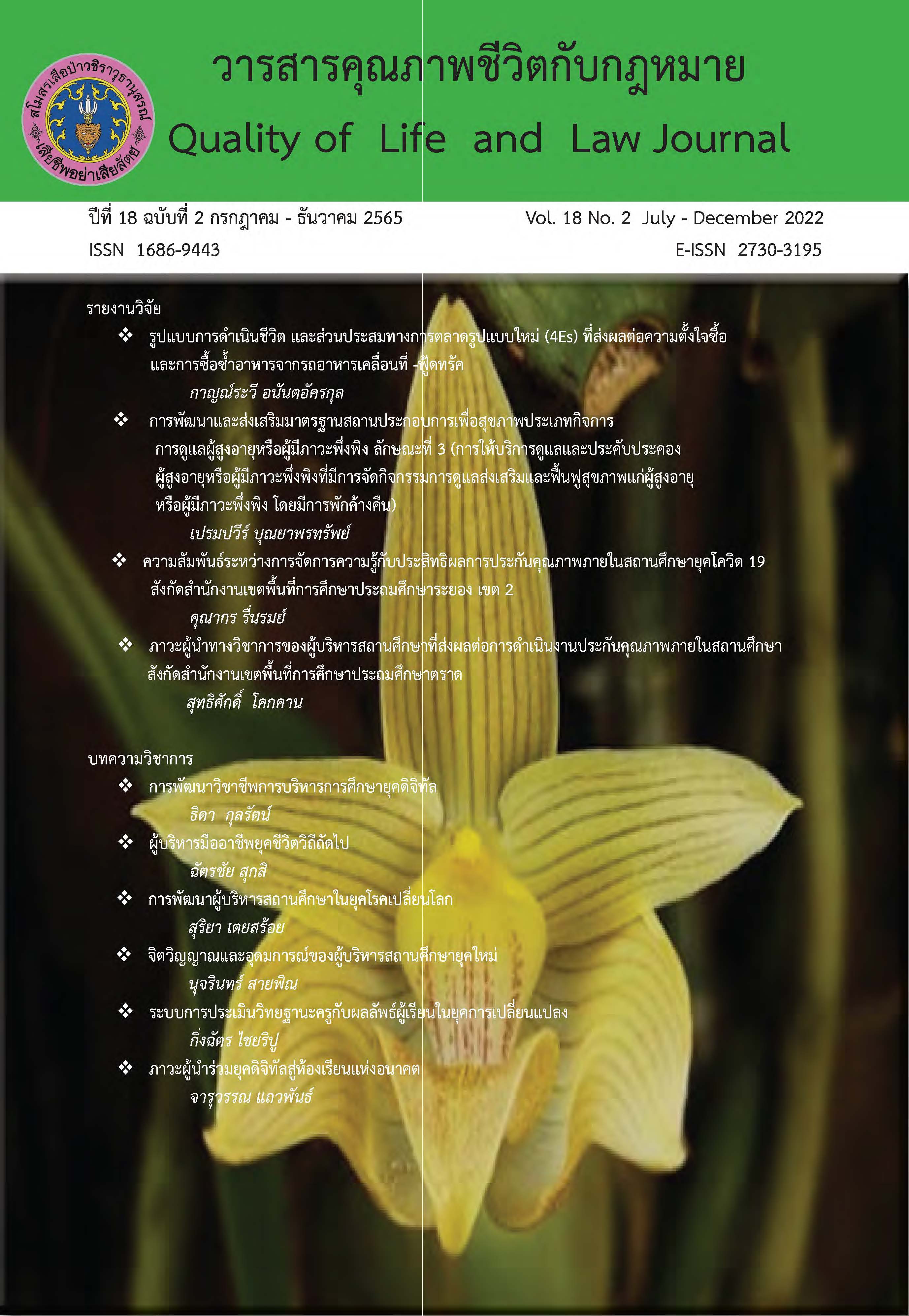Spiritual and Ideological Leadership of School Administrators in a New Era
Main Article Content
Abstract
The administration of educational institution administrators in the new era is based on spirituality and ideology as the internal driving force with three development guidelines:
1) Self-development; As an executive, you must study and seek knowledge all the time. To keep up with the world, keep up with people, starting with self-development first. Self-development can be developed in 3 ways: physical, important elements are body, speech, and mind. 2) Development of human service skills. able to manage people intelligently and the accumulation of management intelligence good people management will become the prestige of the executives. If executives have prestige in themselves, then their subordinates will perform their duties with willingness and full strength, which is an important mechanism for the organization to meet its goals. And 3) Development of management. As an executive, you have to work hard. and know how to work, perseverance, patience, public mind, sacrifice, and never give up on obstacles. Flexible management Democracy When executives follow the aforementioned guidelines, executives will work with efficiency and prestige and lead the organization to its goals successfully. Even executives are faced with various problems and obstacles. Executives will be immune and able to overcome obstacles as well.
Article Details

This work is licensed under a Creative Commons Attribution-NonCommercial-NoDerivatives 4.0 International License.
- บทความหรือข้อคิดเห็นใดๆ ในวารสารคุณภาพชีวิตกับกฎหมายเป็
- กองบรรณาธิการไม่สงวนสิทธิ์
References
กมล รอดคล้าย. (2565). คุณลักษณะและบทบาทของนักบริหารการศึกษายุคใหม่ : ดร.กมล รอดคล้าย. ข่าวสำนักงานรัฐมนตรี ศธ., หน้า 1, https://www.kruupdate.com/.
กรมสุขภาพจิต. (2563). New Normal ชีวิตวิถีใหม่. https://dmh.go.th/news/.
ชัยอนันต์ สมุทรวณิช. (2561). การเมืองกับการบริหาร .กรุงเทพฯ. บรรณกิจ.
ชิดกมล ยะสุรินทร์ กัญภร เอี่ยมพญา และนิวัตต์ น้อยมณี. (2562). คุณลักษณะผู้บริหารในศตวรรษ ที่ 21 ที่ส่งผลต่อการมีส่วนร่วมของครูในสถานศึกษา สังกัดสำนักงานเขตพื้นที่การศึกษา ประถมศึกษาฉะเชิงเทรา เขต 2. วิทยานิพนธ์ครุศาสตร์มหาบัณฑิต, สาขาวิชาการบริหารการศึกษา, มหาวิทยาลัยราชภัฏราชนครินทร์.
บรรจง ลาวะลี. (2560). บทบาทของผู้บริหารสถานศึกษาในยุคไร้พรมแดน. วารสารมหาวิทยาลัยมหามกุฏราชวิทยาลัย วิทยาเขตร้อยเอ็ด, 6(2), 206-215.
พนิดา ยิ้มแฉ่ง. (2549). ปรัชญาและอุดมการณ์ในการพัฒนาตนเอง. บ้านจอมยุทธ,
https://www.baanjomyut.com/library_2/philosophy_and_ideology/index.html
แพง ชินพงศ์. (2562, 14 เมยายน). อิทธิพลของ Social media ที่คนไทยต้องรู้. ผู้จัดการออนไลน์, หน้า 1,
https//www.mgronline.com/qol/detail/.
ภูริกานต์ วัจน์ประภาศักดิ์ และรัตติกรณ์ จงวิศาล. (2557). ภาวะผู้นำเชิงจิตวิญญาณ บุคลิกภาพห้อง องค์ประกอบ วัฒนธรรมองค์การ และผลการปฏิบัติงานของพนักงานระดับบังคับบัญชา บริษัทอุตสาหกรรมกระดาษแห่งหนึ่งในจังหวัดกาญจนบุรี .วารสารสังคมศาสตร์และมนุษยศาสตร์, 40(2), 92-107.
ราชบัณฑิตยสถาน. (2546). พจนานุกรม ฉบับราชบัณฑิตยสถาน พ.ศ. 2542. กรุงเทพฯ. นานมีบุ๊ค พับลิเคชั่น.
ลัดดา จุลวงค์ และศักดิ์ชัย นิรัญทวี. (2564). การบริหารสถานศึกษาด้วยภาวะผู้นำเชิงจิตวิญญาณ. วารสารวิชาการและวิจัย, 151(2), 17-30.
สาระความรู้ สมรรถนะและประสบการณ์วิชาชีพของผู้ประกอบวิชาชีพครู ผู้บริหารสถานศึกษา ผู้บริหารการศึกษา และศึกษานิเทศก์ ตามข้อบังคับคุรุสภา ว่าด้วยมาตรฐานวิชาชีพ พ.ศ. 2556. (2556, 12 พฤศจิกายน). ราชกิจจานุเบกษา, เล่ม 130 ตอนพิเศษ 156 ง, หน้า 47.
สุนันทา สมใจ และวิชุดา กิจธรธรรม. (2561). การบริหารสถานศึกษาด้วยภาวะผู้นำทางเทคโนโลยี.
https://dtc.ac.th/wpcontent/uploads/2019/04/21.
Fry L.W. (2003). Spiritual Leadership and Organizational Performance: An Exploratory Study. Tarleton State University, Central Texas.


